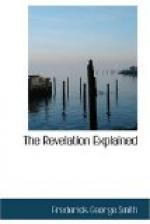8. And unto the angel
of the church in Smyrna write; These
things saith the first and
the last which was dead, and is
alive;
9. I know thy works,
and tribulation, and poverty, (but thou art
rich) and I know the blasphemy
of them which say they are Jews,
and are not, but are the synagogue
of Satan.
10. Fear none of those things which thou shalt suffer: behold, the devil shall cast some of you into prison, that ye may be tried; and ye shall have tribulation ten days: be thou faithful unto death, and I will give thee a crown of life.
11. He that hath an ear,
let him hear what the Spirit saith unto
the churches; He that overcometh
shall not be hurt of the second
death.
Smyrna was situated on a bay of the Aegean Sea, its beautiful harbor rendering it from time immemorial one of the most important commercial cities of Asia Minor. History does not inform us when the gospel was first introduced in this city; but at a very early date a large congregation existed there, with the venerable Polycarp as its pastor. He suffered death by martyrdom under the reign of Marcus Aurelius about A.D. 167.
In each of the seven letters to the churches Christ introduces himself by some appellation significant of the character he assumes toward them. In this he styles himself “the first and the last, which was dead, and is alive,” a fact very important for that congregation to remember during the great seasons of persecution and oppression through which they were to be called to pass.
Against this church Christ has no words of condemnation to utter; all is encouragement and promise. Their condition of poverty is mentioned. It is probable that this very poverty arose because of their accepting Christianity and taking joyfully the spoiling of their goods; for it is a well-known fact that, when individuals embrace Christianity in an idolatrous land, they are disinherited by parents, cast out by relatives, and denied public employment. Even the community refuses to associate with them or to render them assistance in any form. Their means of subsistence is thus cut off, and they are harassed in every possible manner. Perhaps this is the very trial of poverty the church of Smyrna passed through; but Christ declares that they are rich: yea, God hath “chosen the poor of this world rich in faith, and heirs of the kingdom which he hath promised to them that love him.” Jas. 2:5. Their enemies may think that they have reduced them to a condition of wretchedness, but in this the persecutors are mistaken. God says the righteous are rich. A certain writer has remarked, “There is many a rich poor man, and many a poor rich man.”




